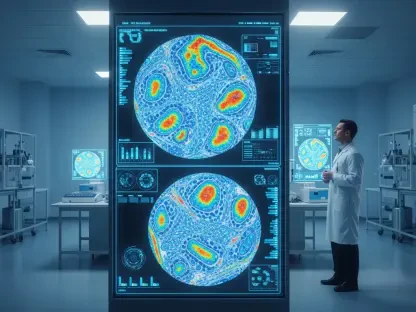As technology continues to reshape industries worldwide, the healthcare sector stands at a pivotal moment where artificial intelligence (AI) promises to revolutionize diagnostics and patient care, yet faces significant roadblocks in real-world application within England’s National Health Service (NHS). A groundbreaking study led by researchers from University College London (UCL), recently published in a prominent medical journal, sheds light on the daunting challenges of embedding AI tools in this complex system. This research, focusing on a £21 million initiative to deploy AI for diagnosing chest conditions like lung cancer across numerous hospital trusts, uncovers a landscape riddled with delays, skepticism, and systemic barriers. Far from being a seamless solution, the integration of AI into an overburdened healthcare system reveals a gap between ambition and execution, raising critical questions about how such innovations can truly transform patient outcomes.
Unpacking the NHS AI Initiative
Delays and Deployment Challenges
The ambitious NHS England initiative, targeting 66 hospital trusts, aimed to harness AI for faster and more accurate diagnosis of critical conditions, yet stumbled early in its rollout. Contract negotiations stretched far beyond initial timelines, often lasting four to ten months longer than expected, stalling progress significantly. By the midpoint of implementation, a substantial portion of trusts—23 out of 66—had yet to integrate these tools into clinical practice, highlighting a disconnect between planning and action. Overworked clinical staff struggled to engage with the new technology, while local governance approvals added further layers of complexity. These delays reflect not just logistical hiccups, but deeper issues in aligning cutting-edge tools with the day-to-day realities of a sprawling healthcare network, where time and resources are perpetually stretched thin.
Beyond the surface-level setbacks, the initiative faced hurdles in merging AI with existing NHS IT systems, many of which are outdated and vary widely across trusts. This lack of uniformity created technical barriers that slowed adoption, as compatibility issues emerged repeatedly during deployment. Staff skepticism also played a significant role, with many healthcare professionals expressing uncertainty about AI’s reliability and relevance in clinical settings. The novelty of the technology, while promising, often left personnel unprepared to trust or utilize it effectively. Such challenges underscore the necessity of addressing not only the tools themselves but the environment into which they are introduced, ensuring that foundational issues are resolved to prevent prolonged stagnation in critical healthcare advancements.
Systemic Barriers in a Diverse Landscape
The NHS, with its vast network of organizations, presents a uniquely fragmented system where uniform implementation of technology is inherently difficult. The study highlighted how diverse clinical needs and IT infrastructures across hundreds of entities complicate the adoption of standardized AI diagnostic tools. Hospitals with dedicated project managers reported smoother transitions, yet not all trusts could afford such resources, revealing disparities in capacity that hinder progress. This inconsistency points to a broader challenge: the expectation that a one-size-fits-all solution can address the nuanced demands of varied healthcare settings often falls short when faced with real-world diversity.
Further complicating matters, the research identified a critical gap in staff readiness to embrace AI. Many clinicians lacked a clear understanding of how these tools could enhance their work, leading to resistance rooted in unfamiliarity rather than outright rejection. Without structured support to bridge this knowledge divide, the risk of underutilization looms large, potentially undermining the very benefits AI seeks to deliver. The findings emphasize that successful integration hinges on tailored approaches that account for local contexts, ensuring that technological advancements are not just imposed but adapted to fit the specific workflows and challenges of each trust within the NHS framework.
Lessons for Future AI Adoption
Building Trust Through Education
Looking ahead, the study offers invaluable insights into overcoming the cultural and educational barriers that currently impede AI integration in healthcare. A recurring theme was the urgent need for comprehensive training programs to familiarize staff with AI’s capabilities and limitations, fostering confidence in its use. Hospitals that prioritized education saw more positive engagement, suggesting that investing in knowledge-building can significantly ease adoption. By equipping clinicians with the skills to navigate these tools safely and effectively, the NHS can transform skepticism into partnership, ensuring that AI becomes a trusted ally in diagnostic processes rather than an unfamiliar burden.
Additionally, the role of clear communication cannot be overstated in addressing staff hesitations. Beyond technical training, there must be ongoing dialogue about AI’s impact on patient care, dispelling myths and highlighting tangible benefits through real-world examples. The researchers noted that guidance from leadership is crucial in setting a tone of openness to innovation, helping to shift mindsets across all levels of staff. As the NHS continues to grapple with resource constraints, strategic partnerships with educational institutions or tech providers could offer scalable solutions to deliver this vital training, paving the way for smoother transitions in future initiatives.
Strategic Planning for Sustainable Impact
Reflecting on the setbacks, the study underscored that AI is not a quick remedy for the NHS’s mounting pressures, but rather a long-term investment requiring meticulous planning. Policymakers had initially overestimated the ease of embedding such technology into an already strained system, a misstep that future efforts must avoid through robust project oversight. Tailored strategies that anticipate logistical and technical challenges, coupled with dedicated management teams, emerged as non-negotiable elements for success. These measures can help align AI deployment with the unique structure of the NHS, preventing the kind of widespread delays witnessed in this initiative.
Moreover, the findings tied into broader policy goals, particularly the UK government’s 10-year health plan, which positions AI as a cornerstone of healthcare improvement. The lessons drawn from this research provide a roadmap for ongoing and future projects, emphasizing adaptability in implementation timelines and resource allocation. As the research team continues to evaluate the early performance of these AI tools, their work promises to refine understanding of how best to integrate innovation without exacerbating existing strains. Ultimately, the path forward demands a balance of ambition and pragmatism, ensuring that technological progress in healthcare delivery is both achievable and impactful.









